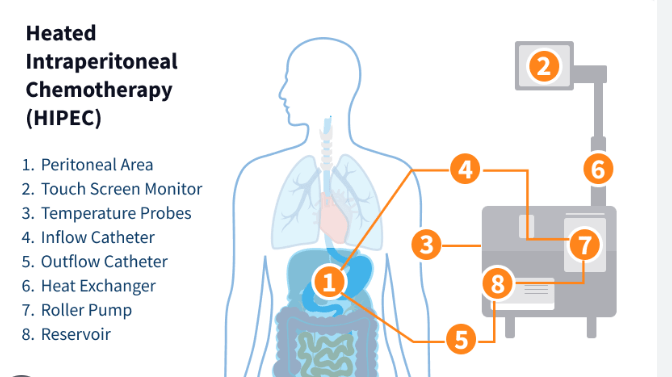Cancer treatment has evolved dramatically, and one of the most advanced options for certain abdominal cancers is HIPEC Cancer Surgery (Hyperthermic Intraperitoneal Chemotherapy). This innovative procedure targets cancer cells directly while reducing recurrence. In this article, we explore HIPEC, its benefits, risks, and why consulting an experienced oncologist like Dr. Nitin Singhal is crucial.

HIPEC is a surgical procedure designed to treat cancers that have spread within the abdominal cavity, such as peritoneal cancers. During surgery:
Benefits of localized treatment:
Cancers commonly treated with HIPEC include:
Peritoneal cancer affects the lining of the abdomen (peritoneum). Early symptoms include:
Early detection is key. Dr. Nitin Singhal recommends timely evaluation for anyone with these symptoms.
Unlike standard chemotherapy, which circulates through the bloodstream, HIPEC Cancer Surgery delivers heated chemotherapy directly to the abdominal cavity, immediately after tumor removal.
Advantages:
Duration: 6–10 hours depending on tumor complexity.
While HIPEC is highly effective, risks include:
Selecting an experienced surgeon like Dr. Nitin Singhal reduces risks and ensures careful monitoring.
Ideal candidates have:
Doctors evaluate imaging scans, lab results, and prior treatments before recommending HIPEC.
Recovery may vary, but common recommendations include:
“After my HIPEC surgery, I felt a new lease of life. Recovery was smoother than I expected, and follow-ups show no signs of recurrence.” – Patient of Dr. Nitin Singhal
Stories like these show the impact of advanced treatment and expert care.
Ongoing research is improving HIPEC outcomes:
These advancements aim to make HIPEC safer, more effective, and accessible
Dr. Nitin Singhal offers:
Patients benefit from his expertise and experience in complex cancer surgeries.
1. What types of cancer can be treated with HIPEC?
HIPEC Cancer Surgery is primarily used to treat cancers that have spread within the abdominal cavity, often referred to as peritoneal cancers. Common cancers treated with this advanced procedure include ovarian cancer, colorectal cancer, stomach cancer, and peritoneal mesothelioma. Additionally, patients with certain abdominal metastases may also benefit from this targeted approach. By combining cytoreductive surgery with heated chemotherapy, HIPEC allows surgeons like Dr. Nitin Singhal to remove visible tumors and destroy microscopic cancer cells, improving outcomes and reducing the risk of recurrence.
2. How long does a HIPEC surgery take?
The duration of a HIPEC procedure depends on the complexity of the tumor spread and the patient’s overall health. On average, it takes 6–10 hours, as it involves both cytoreductive surgery to remove visible tumors and the circulation of heated chemotherapy throughout the abdominal cavity. This combination of advanced cancer surgery and targeted chemotherapy is more effective than conventional treatments but requires meticulous care and planning to ensure safety and maximum effectiveness
3. Is HIPEC safe?
Yes, HIPEC surgery is considered safe when performed by an experienced oncologist like Dr. Nitin Singhal. While all major surgeries carry some risks, including infection, bleeding, or temporary organ stress, these can be effectively managed with proper pre-operative evaluation and post-operative care. Patients benefit from a minimally invasive cancer treatment approach, as HIPEC delivers chemotherapy directly to the peritoneal cavity, reducing systemic side effects compared to traditional chemotherapy. Safety and effectiveness are highest when patients are carefully selected and closely monitored before, during, and after the procedure.
4. How long is recovery after HIPEC surgery?
Recovery time varies depending on the patient’s age, overall health, and cancer stage. Typically, hospital stay lasts 7–14 days, during which patients are monitored for side effects and supported with nutrition and medications. Full recovery can take several weeks, and patients are encouraged to gradually resume physical activity and daily routines. Follow-up appointments with Dr. Nitin Singhal include imaging and lab tests to monitor for recurrence. Patients often experience faster recovery compared to traditional chemotherapy, as HIPEC targets cancer cells directly in the abdomen while minimizing systemic side effects.
5. Does HIPEC improve survival rates?
Yes, HIPEC combined with cytoreductive surgery has been shown to significantly improve long-term survival for patients with peritoneal cancers. By directly targeting residual cancer cells in the abdominal cavity, this procedure reduces the chances of recurrence and improves overall quality of life. Studies on patients with ovarian, colorectal, and stomach cancers have demonstrated higher 5-year survival rates compared to traditional chemotherapy alone. Consulting an experienced oncologist like Dr. Nitin Singhal ensures that patients receive personalized treatment planning, advanced surgical care, and ongoing support for the best possible outcomes.
HIPEC Cancer Surgery is a life-saving, advanced treatment for peritoneal cancers. By combining cytoreductive surgery with heated chemotherapy, it offers targeted, effective results. Consulting Dr. Nitin Singhal ensures expert care, personalized planning, and improved outcomes.
